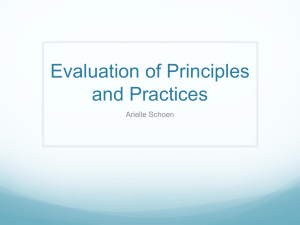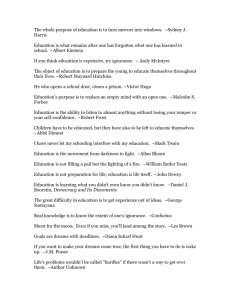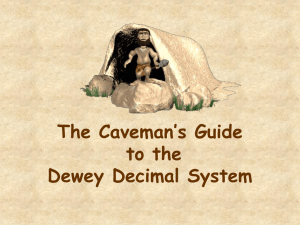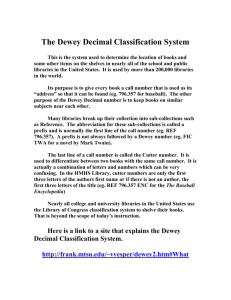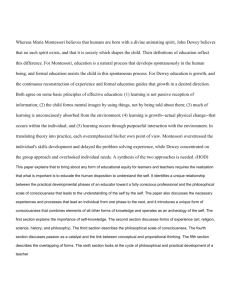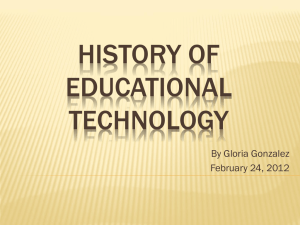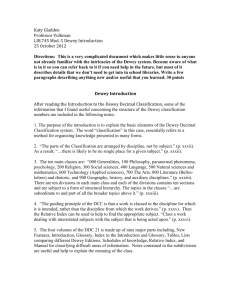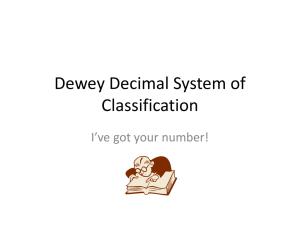Dewey - SWHS-ChildhoodEducation
advertisement
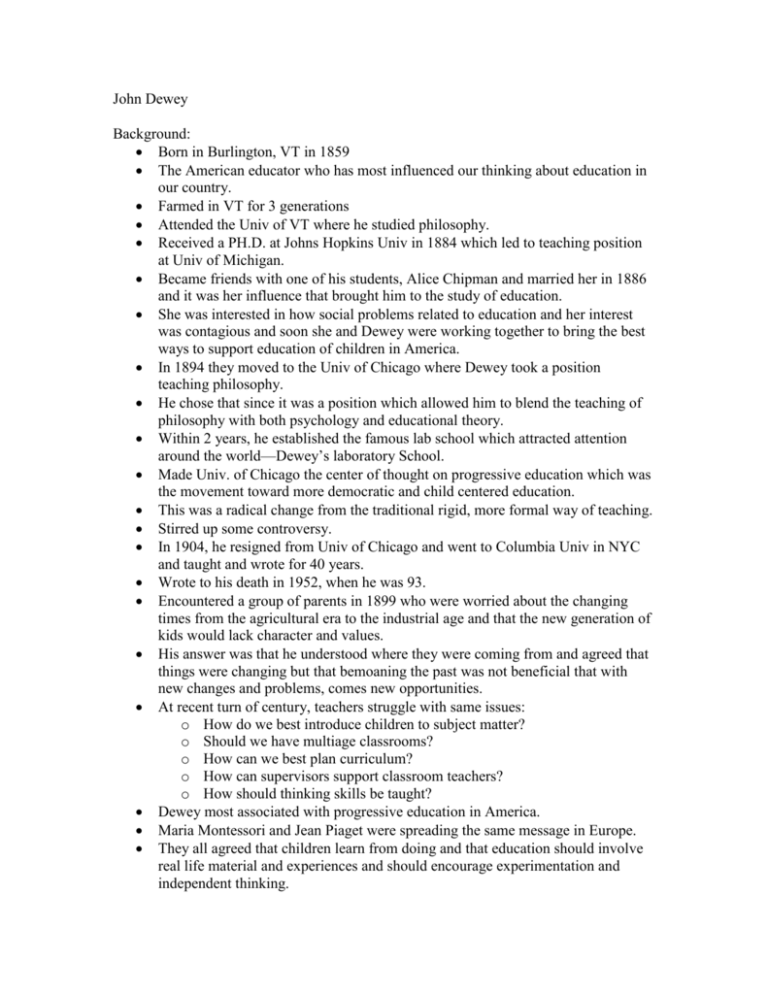
John Dewey Background: Born in Burlington, VT in 1859 The American educator who has most influenced our thinking about education in our country. Farmed in VT for 3 generations Attended the Univ of VT where he studied philosophy. Received a PH.D. at Johns Hopkins Univ in 1884 which led to teaching position at Univ of Michigan. Became friends with one of his students, Alice Chipman and married her in 1886 and it was her influence that brought him to the study of education. She was interested in how social problems related to education and her interest was contagious and soon she and Dewey were working together to bring the best ways to support education of children in America. In 1894 they moved to the Univ of Chicago where Dewey took a position teaching philosophy. He chose that since it was a position which allowed him to blend the teaching of philosophy with both psychology and educational theory. Within 2 years, he established the famous lab school which attracted attention around the world—Dewey’s laboratory School. Made Univ. of Chicago the center of thought on progressive education which was the movement toward more democratic and child centered education. This was a radical change from the traditional rigid, more formal way of teaching. Stirred up some controversy. In 1904, he resigned from Univ of Chicago and went to Columbia Univ in NYC and taught and wrote for 40 years. Wrote to his death in 1952, when he was 93. Encountered a group of parents in 1899 who were worried about the changing times from the agricultural era to the industrial age and that the new generation of kids would lack character and values. His answer was that he understood where they were coming from and agreed that things were changing but that bemoaning the past was not beneficial that with new changes and problems, comes new opportunities. At recent turn of century, teachers struggle with same issues: o How do we best introduce children to subject matter? o Should we have multiage classrooms? o How can we best plan curriculum? o How can supervisors support classroom teachers? o How should thinking skills be taught? Dewey most associated with progressive education in America. Maria Montessori and Jean Piaget were spreading the same message in Europe. They all agreed that children learn from doing and that education should involve real life material and experiences and should encourage experimentation and independent thinking. Dewey’s Theories Three main ideas: Education should be child-centered. Education must be both active and interactive. Education must involve the social world of the child and the community. His thoughts through his document called “My Pedagogic Creed”: Children learn best when they interact with other people, working both alone and cooperatively with peers and adults. Children’s interests form the basis for curriculum planning. The interests and background of each child and group must be considered when teachers plan learning experiences. Education is part of life. Education needs to address what the person needs to know at the time, not to prepare them for the future. Curriculum should grow out of real home, work, and other life situations. Teachers must be sensitive to the values and needs of families. Values and cultures of families and communities should be reflected in and deepened by what happens at school. Teachers do not teach just subject matter, but also how to live in society. Teachers do not just teach individual children, but also shape the society. (parents?) Teachers need to have confidence in their skills and abilities. Teachers need to trust their knowledge and experience and then use those to provide appropriate activities to nurture inquiry and dispositions for learning in the children they work with. The Teacher’s Role: Teachers need to have more confidence when planning children’s learning experiences. While teachers were afraid that instruction would infringe upon the freedom and creativity of their students, he thought that the children need assistance from teachers in making sense of their world. Dewey thought it was important for teachers to observe children and to determine from these observations what kinds of experiences the children were interested in and ready to take on. (Remember Maria Montessori and observation?) He felt it was important for the teachers to determine the curriculum based on knowledge of the children and their abilities. Dewey felt that suggestions and guidance from thoughtful, experienced, knowledgeable teachers was just as important as idea that arrived by accident. Children need teachers to decide what is safe and what is developmentally and individually appropriate for them. Dewey felt that while many took on progressive education because they felt it was a lot easier, that it should be understood that this type of education demanded a lot more observing, documenting, and keeping records of classroom events than traditional methods did. Dewey felt that in order to provide educational experiences for children, teachers must: o Have a strong base of general knowledge as well as knowledge of specific children o Be willing to make sense of the world for children on the basis of their greater knowledge and experience. o Invest in observation, planning, organization, and documentation. His theory in terms of early childhood programs: o Observe children closely and plan curriculum from their interests and experience. o Don’t be afraid to use your knowledge of the children and world to make sense of the world for children. Plan Purposeful Curriculum Make sure there is a purpose to your curriculum other than just an aimless activity that is fun! (Read pages 9-10) Base the curriculum on knowledge of both specific children and the learning process. Make Sense of the World for Children Teachers must be willing to tap their general knowledge of the world to help children make sense of their surroundings and experiences. (Read pages 10-13) Use their knowledge of the world to expand children’s knowledge. Education vs Mis-Education Teachers should ask themselves what conditions make any experience worthy of being called “educational”. He insisted that education and experience are related but not equal and some experiences are not educational at all. Those are called mis-educative experiences. Dewey believed that an activity is not a learning activity if it lacks purpose and organization. He criticized the approach whereby teachers had children learning information via rote, reciting facts out of context. He criticized the approach whereby teachers set up experiences without providing any unifying theme, continuity, or purpose and just said the children will enjoy this. Dewey felt that teachers need to ask the following questions when they plan activities for their children: o How does this expand on what these children already know? o How will this activity help this child grow? o What skills are being developed? o How will this activity help these children know more about their world? o How does this activity prepare these children to live more fully? Dewey felt that the experience could only be called “educational” if it meets these criteria: o It is based on the children’s interests and grows out of their existing knowledge and experience. o It supports the children’s development. o It helps the children develop new skills. o It adds to the children’s understanding of their world. o It prepares the children to live more fully. How Dewey’s criteria can guide early childhood teachers: o Do not accept “It’s fun” as the rationale for curriculum but ask how the activity will support children’s development and learning. When people are engaged in learning something of interest to them and that is related to their experience, the process of learning is enjoyable. (much like why child dev. Students like the class—it’s fun b/c it is of interest to them and they have experienced it.) However, Dewey felt that it is important not to just have fun for sake of having fun but that it builds children’s learning. (Page 1516) Activity should leave the children wondering or searching for more. o Be sure there is organization and documentation of the children’s work. Read pages 16-18….bring up experience of milestones activity recently done in child development and how differed from their time to now and now has more meaning which have them personally interested in topic and searching for more. (If time permitted or if persons wanted to do an independent study from this…could) Documentation takes form of pictures, charts, stories, graphs, etc.

